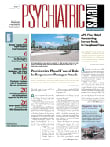APA and the American Academy of Psychiatry and the Law (AAPL) contend in an August 3 amicus curiae brief submitted to the U.S. Court of Appeals for the 9th Circuit that physicians have the authority to administer psychotropic medications involuntarily to prevent criminal defendant Jared Lee Loughner from harming himself and others.
"When courts address psychiatric issues, APA wants to be certain that they have accurate information about the nature of mental disorders and their treatments," said Paul Appelbaum, M.D., chair of APA's Committee on Judicial Action and a former president of both APA and AAPL. "That was the primary goal of this brief. In addition, since the outcome of this case could affect the ability of correctional psychiatrists to treat dangerous patients, we wanted the court to understand the importance of keeping medical decision making in the hands of physicians rather than judges."
Loughner, who has been diagnosed with schizophrenia, pleaded not guilty in the Tucson, Ariz., shootings in January that killed six people and injured 13 others, including Rep. Gabrielle Giffords (D-Ariz.). In May, U.S. District Court Judge Larry Burns found Loughner incompetent to stand trial and sent him to a federal prison hospital in Springfield, Mo., where he began receiving antipsychotic treatment in mid-June.
Attorneys for Loughner subsequently filed suit against the government, maintaining that he is entitled to a judicial hearing prior to being involuntarily medicated. Burns denied the defendant's motion to enjoin forced treatment, but 9th Circuit Judges Alex Kozinski, Kim McLane Wardlaw, and Richard Paez have since honored Loughner's request for a preliminary injunction against compulsory medication until a hearing before the full court that was scheduled to be held at press time.
APA and AAPL's argument in the brief, which does not express support of either party, is grounded in three primary assertions:
• The Supreme Court's 1990 ruling in Washington v. Harper established a precedent for the government to order that involuntary medication can be administered to a pre-trial detainee who is seen as a danger if appropriate administrative procedures are followed.
The argument of Loughner's attorneys primarily hinges on the fact that he has not been tried or convicted and thus should be afforded more a protective right—a line of reasoning that the appellate court concurred with in its July 12 order. However, APA and AAPL contend that legal precedence does not support making a determination based on such a distinction.
"In Harper, the Supreme Court held that the state's interest in avoiding danger in a custodial setting... justifies administration of medically appropriate antipsychotic drugs," wrote APA and AAPL. "That state interest does not depend on whether the inmate in question is a pre-trial detainee or instead a convicted prisoner; rather, it reflects the state's interest in maintaining the "safety and security" of the custodial institution and in protecting the life and safety of the inmate."
• Antipsychotic medications are an accepted and essential treatment for most acute psychotic illnesses, including schizophrenia.
APA and AAPL also challenged the appellate court's concern that antipsychotic medications pose dangerous side effects that could be avoided by the use of sedatives as an alternative treatment.
"As a matter of accepted medical practice, the appropriate way to reduce the level of dangerousness of a person suffering from schizophrenia is to address the symptoms underlying potential violence through appropriate medication, not merely to sedate a still-delusional and hallucinating person, who may remain dangerous despite the sedation or once it wears off," wrote APA and AAPL.
• The request for a judicial hearing prior to administering psychotropic medication to a dangerous pretrial detainee is neither required under current law nor the most appropriate means for determining the medical needs of the defendant.
While Loughner's attorneys argue that the Court's Harper ruling grants the defendant the right to a full judicial hearing prior to involuntary administration of medication, APA and AAPL maintain that any determination regarding medical treatment of the defendant should be made by a psychiatrist rather than a lay judge. APA and AAPL also contend that the requirement of a judicial hearing would create both an administrative burden and extend the potential for violent outbursts.
"Such a requirement... would create serious risks and burdens for custodial officials, medical personnel, and other inmates, while doing little, if anything, to protect the legitimate due-process interests at stake," wrote APA and AAPL.
Despite the appellate court's July 12 order to halt the forced use of antipsychotics until a late August hearing, the psychiatrists treating Loughner resumed involuntary medical treatment "on an emergency basis" upon concluding that his mental faculties were rapidly deteriorating and that he represented a danger to himself. On July 21, the 9th Circuit Court denied the defense's emergency motion to enforce the injunction and compel the prison hospital to produce daily records documenting the use of antipsychotic medications.

